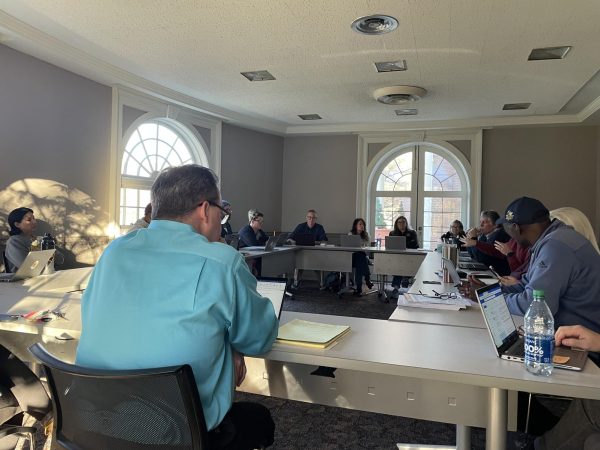Following the news that Baldwin Wallace University is amidst a larger-than-expected budget deficit for the 2023-24 fiscal year, faculty, staff and students told The Exponent that there has been a lack of communication surrounding the budget issue.
Emma Stamper, a junior sustainability and international business double major, said that she had not heard anything about the sustainability program being potentially cut other than through her peers.
Katie Ritzema, a junior piano performance and music history double major, said she and her peers just want clarity as to the piano performance program’s future.
“I think that overall, it would just be nice to get some more communication on it,” Ritzema said.
“And I’m looking forward to hearing what the final decisions are. I think it’d be nice just to kind of know for sure what programs were more in danger.”
Student government is the recommended means for communications for students, Provost Stephen Stahl said. However, Student Body President Matthew Perry said that he was not even made aware of the deficit until he asked. The first time the news was brought to the Student Senate’s attention was on Sept. 26 after a senator inquired into its impact on the University’s plans.
“Students at the same time are saying, ‘No, we want to know what’s going on.’ In some cases, it actually just causes more stress because they haven’t said anything about it,” Perry said.
Dan Karp, assistant vice president and director of University Relations, said since the issues are not yet impacting students, they [students] do not need to know.
“If any changes that would happen in order to help mitigate the deficit would of course not affect student experience,” Karp said. “We’re not looking for the students for a solution.”
Karp said: “if the rumor mill is getting out of control,” the University will put out their first official statement to students saying that the University is working through a budget deficit.
As per new guidelines, the minimum requirement for a session to be offered is to have 10 students enrolled in a class, as opposed to the previous minimum number of six.
“Faculty were told this [session reduction] was going to happen,” Stahl said. “They weren’t consulted about whether or not it should. That’s sort of in the example of when things go through budgetary decisions, being the responsibility of the administration that fits into that category.”
Ellen Posman, chair of the religion department, said that communication has not been coming through “official channels.”
“It should be coming through official channels as official messages to everyone or certainly to the parties that it affects rather than coming through The Exponent, or through posted meeting minutes from somewhere or through the rumor mill going around campus,” Posman said.
Assistant Sociology Professor Elizabeth Ross said with this lack of communication across campus, she has to question the information that she received from her peers.
“That’s the first thought, like ‘Where did [they] get this information and does it make sense?’ or is it really just knee jerk?” Ross said. “It’s not intentional, but just misinformation, like rumors.”
Posman said that she had felt this effect especially through the news that her program — the Department of Religion — may be cut because of the deficit.
“I feel like it’s all hearsay, and therefore can’t be checked,” Posman said. “It would be nice to have things in writing from the administration itself with a plan and exactly how that plan saves money.”
In response, Stahl said that the conversations moving forward surrounding program cuts will revolve around the potential savings that the University would see if each program were to be cut, with scheduled town halls expected to take place within each school after Thanksgiving break.
Karp said that while it would be better to be able to provide information immediately, the University is just not yet there.
“You want to say ‘problem, solution, right?’” Karp said. “We’re not yet at the solution part, are we?”
One means for official communication between faculty and administration throughout this process has been the regularly held Faculty Senate and Executive Committee meetings, which have been sent out to 763 people including members of the administration, staff and all faculty. However, there are only 285 voting Faculty Senate members.
Ken Schneck, the secretary of Faculty Senate and professor & director of Leadership of Higher Education, has been sending out these meeting minutes. Schneck said that with the current system, information skewed toward the perspectives of faculty members is often sent out to a larger audience before it is officially announced from the administration.
“Sometimes the minutes go out announcing things before they’ve been announced by the University,” Schneck said.

On Oct. 23, as a result of long-lasting concerns about communications, Schneck
asked the administration during an Executive Committee meeting if more communications could come straight from the University to the staff. Since then, President Bob Helmer has begun sending out bi-weekly emails across faculty and staff, providing updates as to what is occurring with the budget deficit.
Christie Schefler, director of the Center for Global Exploration, said that in times like these, she and other staff members feel as though there should be a Staff Senate equivalent to Faculty Senate, an organizational body that previously existed on campus before the COVID-19 pandemic.
“It would be great to have staff representation in these conversations, because right now, the communication is focused more on the faculty side,” Schefler said.
Kent Cleland, president of the Faculty Senate, said that while communication has not been perfect, they are working on improvements moving forward.
“It [communication] is always a concern, but faculty is committed to improving that… Administration is open to improving that also,” Cleland said.





































